Russia Ukraine War: Analysis and Predictions: "The use of intelligence in the Ukraine war has also blurred the line between hard and soft power." | Stoltenberg says war in Ukraine could last for years | Путин, лучше не связывайся, – командующий ВВС Германии предостерег диктатора от нападения на НАТО
Russia Ukraine War: Analysis and Predictions
google.com/search?q=Russi… | cnn.com/2022/06/14/pol…

At its core, war is about power—who has it, who doesn’t, and who can effectively use it. The war in Ukraine is no exception. But the outcomes over the first months of the war have surprised many observers, challenging some traditional assessments of military and economic power. Most unexpected has been that Russia’s military advantages did not allow it to accomplish its initial objectives. Instead, Ukrainian forces have held their own and even pushed the Russian military back in places. At least a part of the explanation lies in some changes in the nature and exercise of power that have emerged over the past decade. Three developments have been particularly influential, allowing Ukraine to level the playing field in key ways. Together, these changes have allowed Ukraine to far exceed its performance in the 2014 war with Russia, but they also create new challenges for states seeking to exert influence.
A first development has been the extensive influence of non-state groups that are able to act autonomously on the international stage. These actors have increased in number and independence in recent years, as well as in the types of power they are able to wield. Their actions not only amplify state power but also constrain state flexibility.
One example is the role of multinational corporations, whose influence on the Western response to Russia’s invasion is unprecedented in scope—in part thanks to their growth in size, wealth, and reach, as well as their evolving legal status. Historically, corporate activity in conflict has been mostly motivated by profit, with companies either seeking increased sales directly—such as in Iraq in 2003 or during the world wars—or supporting peace to advance business prospects, as in Northern Ireland. But in the Russia-Ukraine war, most multinational corporations have acted primarily on political motives, often at significant cost to their bottom lines. The decisions of almost 1,000 companies to pull out of Russia have reinforced the West’s use of economic power but complicated its political leverage, by making it harder to use sanctions relief as a diplomatic tool.
Non-state groups have also used their power in ways and speeds that were not possible before social media. This trend emerged first in the fight against the self-proclaimed Islamic State and the war in Syria and has greatly expanded in the Russia-Ukraine conflict, due to both widespread social media use and increasing Internet saturation in Ukraine. People on the ground in Ukraine have served as influencers and real-time sources of unfiltered information, and those outside Ukraine have organized relief efforts at a global scale. Today’s response networks are able to deploy in ways not possible before TikTok or Twitter, including by crowdsourcing funding. As just two examples, within days of the conflict’s start, Airbnb used its network to offer free housing to those fleeing Ukraine and José Andrés’ World Central Kitchen arrived on the front lines to distribute food.
States that are best able to take advantage of non-state groups’ activities may have a decided advantage in projecting national influence. This tactic can be especially important for smaller countries that might otherwise have more limited influence, as illustrated during the war by Ukrainian President Volodymyr Zelenskyy’s ability to capitalize on grassroots efforts through media campaigns. But the growing autonomy and power of these non-state actors also creates risks. States may seek to encourage non-state groups to act politically in some cases, but they will also need ways to direct or at times restrain these groups’ behaviors. This will be a tricky balance, especially when the actions, and even emergence, of such groups can be hard to predict.
The second development is the extent to which relationships between states serve as key sources of power that are decisive in shaping conflict outcomes. Typically, state power is measured by looking at capabilities, such as military weapons or GDP. However, as globalization and changes in technology make it cheaper and easier for goods, services, and information to flow across borders and advance interconnectedness between countries, relationships such as alliances and trade networks have become as important to any assessment of national power as capability-based measures. Interdependence can be a double-edged sword, constraining state power even as it advances it. Still, in today’s interdependent world, when two states compete, the one with stronger and more robust relationships may retain the upper hand, even in the face of capability imbalances.
Interdependence today is more extensive than at any point in the past, connecting more countries and intertwining military, economic, political, and ideological spheres. In the period prior to World War I, known for its relatively high level of interdependence, a narrow set of states boasted deep integration. Major European powers such as Britain, France, Germany, and Russia were tightly connected economically, but ties to the rest of the world—even the rest of Europe—were more limited and often slowed by factors like lengthy transit times. During the Concert of Europe, another period known for its interconnected relationships, true interdependence was even weaker, with ties based on informal commitments and a series of narrow, issue-specific agreements.
The current conflict in Ukraine offers several examples of the ways in which deeper, more interdependent relationships have served as both sources and constraints on power to shape outcomes. For instance, the United States and NATO allies have relied on their strong political, economic, and military relationships to impose far-reaching sanctions and to mobilize massive military aid. And ideological ties between NATO allies and Ukraine are another example of relational power that has given Ukraine access to military and economic assistance, intelligence and infrastructure support, and international status, all of which have been central to its success so far. At the same time, these relationships create commitments that can harden over time and limit decisionmaking space for all parties—now evidenced in the debates over the war’s trajectory.
Russia’s economic and political ties also simultaneously empower and constrain its leaders. Although Russia tried to sanction-proof its economy prior to the invasion, its connection to international financial markets left it vulnerable to punishing Western financial sanctions. However, its central position in oil and gas trade has provided an economic lifeline while bounding Western leverage. Russia has also exploited relational power from its long-standing ideological and institutional ties to India and countries in Africa and has benefited from its deepening connection with China. At this point in the conflict, it’s unclear whether Ukraine or Russia gains relatively more from relational power, but relationships and interdependence are playing complex direct and indirect roles in shaping state behavior.
While interdependence has been influential in the past, its risks and the benefits are magnified by the depth and scope of interstate ties. This does not mean that states should entirely avoid interdependence—although some may be tempted as they watch Russia’s struggle with sanctions. States should, however, pay careful attention to the net balance of their interdependent relationships and sources of self-sufficiency. Independence will be most important to protect the resources, capabilities, and tools that are central to national interests, but it may also be preferrable where the costs of self-sufficiency are low or where there are unique benefits from domestic production. For example, domestic investment in solar energy technology can have knowledge spillover effects that lead to future innovation. This may be one reason to encourage domestic production in this area. Interdependence should be used to pursue efficiencies and to build relationships, and this strategy may also be helpful in tying adversaries into the international system to avoid conflict.
A final development is that some of the most decisive forms of power in the current conflict have not relied primarily on hard power derived from military capabilities or economic wealth. Nor have they been examples of soft power, which influences through norms and ideas. Instead, they have been forms of power that blur this distinction and combine the two. The use of tools of power that merge hard and soft power is not entirely new. For example, China’s use of lawfare—the manipulation of legal frameworks and norms to achieve military goals—in the South China Sea has been a point of focus in recent years. Similarly, there has been much attention on Russia’s weaponized use of information since at least 2016. But the use of such tools has been especially important in the Ukraine conflict because they help Ukraine overcome Russia’s advantages in military size and strength and facilitate a far-reaching Western response without necessitating military intervention.
The U.S. response to Russia’s invasion has relied on tools that combine its soft power—in the form of U.S. brands, companies, and even dollars—with more coercive mechanisms. First, while sanctions are typically considered a form of hard power, the corporate pullout from Russia amplified both the sanctions’ hard economic effects and the implied condemnation and shaming of Russian actions thanks to the well-publicized exits of brands such as Starbucks and McDonald’s. As a different example, U.S. efforts to cut Russia off from currency markets have relied on U.S. financial influence, which derives from both its economic wealth (hard power) and the reputational power and credibility of the U.S. dollar (soft power). Finally, the decisions of sports leagues around the world to ban Russian athletes and cancel competitions to be held in Russia have had a similar effect, combining economic penalty with social and cultural sanction in a single action.
The use of intelligence in the Ukraine war has also blurred the line between hard and soft power. Throughout the conflict, the United States and its allies have used the release of what might otherwise have been classified intelligence not just for military or operational purposes but also to feed wider influence operations, discredit Russian narratives, and undercut Russian morale—an approach that does not fit neatly into either the soft or hard power category. While certainly not the first time that release of intelligence and data hacks have been weaponized, the approach is now being used in a very different context. Not only has the scale of the campaign been more extensive and the duration longer, but the goals have been broader—not just to thwart Russian military operations with cutting-edge intelligence capabilities, but to pre-empt Russian disinformation campaigns by crowding the information space and undermining the credibility of Russian leaders in the eyes of their own citizens. Finally, the audience of these efforts has been more diverse, targeting people in the West, Ukraine, and Russia—sometimes with direct appeals to all three.
A final example of the blurred line between hard and soft power has been the rise of thousands of so-called hacktivists who are engaging in an online campaign to hack Russian websites and combat Russian disinformation. These groups have been using cyber capabilities—a hard power tool—to seize Russian data and hold it hostage, to collect and release internal Russian government communications, and to break through Russia’s internet blockade to communicate with its citizens. These activities have both operational goals—to undermine Russian capabilities—and goals of persuasion, to break Russian popular support for the war.
Campaigns that blend hard and soft power have imposed meaningful costs on Russia, and while they do not involve direct military action, the risks of escalation may be unexpectedly high because they have multiple targets and many audiences at once. When employing such tools, policymakers may need to use incremental approaches to avoid unwanted escalation spirals.
Some analysts argue that the world has re-entered a cold-war period, dominated by bipolarity and competition between autocracy and democracy. But the greater diversity of actors exercising power, the more extensive interdependence, and the proliferation of tools that combine hard and soft power suggest otherwise. Instead, the world seems to be moving to an environment that is hypercompetitive but in which power is more diffuse, dynamic, and cross-cutting than was the case during the Cold War. This may lead to increasing international instability and conflict, and it certainly creates an array of new challenges for states. But it also creates new opportunities, especially for smaller states pushing back on larger ones and for non-state actors seeking influence. To achieve the upper hand, policymakers will need to account for and coordinate the many non-state actors that are able to exercise power and simultaneously leverage relationships and capabilities to exert influence.

June 16, 2022
Seth G. Jones: Welcome to this event, this discussion on the Russian invasion of Ukraine and a current update on the war in Ukraine. (Applause.)
I have the extraordinary pleasure of introducing several esteemed colleagues.
The first is sitting next to me, Mike Vickers. Mike is the former U.S. undersecretary of defense for intelligence, former assistant secretary of defense for special operations, and a former CIA case officer involved, among other areas, in the Afghan war against Soviet forces.
I also have Eliot Cohen. Eliot Cohen is at the Johns Hopkins University School of Advanced International Studies, and he’s the Arleigh Burke Chair in Strategy at the Center for Strategic and International Studies.
And then, Emily Harding, who is a senior fellow at the Center for Strategic and International Studies, deputy director of the International Security Program, former deputy staff director at the Senate Select Committee on Intelligence, and a former analyst at the Central Intelligence Agency. (Applause.)
Thanks to all of you for joining us here at CSIS.
Let me start with Eliot. Eliot, we have talked about this issue, including in the last event that we did, where you outlined the Russian – particularly Vladimir Putin’s objectives – political and military objectives. Well, we’ve now moved into June. As we’re going to see in a moment on the battlefield picture, the war has moved primarily to the east.
So, what are your – what’s your sense right now about where Putin’s political and then, under him, military objectives are right now and how they evolved over the last hundred days or so?
Eliot A. Cohen: So, I think the most important thing is that the political objectives haven’t evolved at all. They remain maximalist. In fact, he’s even been more clear about them as he compares himself to Peter the Great, talks about, you know, powers are sovereign, and then states that are colonial.
He basically wants to re-establish the Russian empire. He’s not interested in re-establishing the Soviet Union. He is interested in re-establishing the Russian empire, and I think that means that eventually what he wants is to eliminate Ukraine as an independent state – and I think further objectives beyond that regarding other countries.
Now, you know, clearly what happened is that they were – the military objectives were set back. I think the military objectives were before completely congruent with that. We’re going to overrun Ukraine in a few days, and establish a client government, and take it from there.
After that failure, after the failure to take Kyiv, after the failure to take Kharkiv, the military objectives, it seems to me, have gotten more limited. They’re basically to try secure Donbas, but also to really grind up and destroy the Ukrainian military.
I can easily imagine them at some point, you know, being willing to grant a ceasefire or something like that, but the most important thing for us to understand is that will only be intermediate. The political objectives remain exactly what they were before. It just – he’s adjusting his military means.
And I’ll say one other thing. I think he adjusts them partly, of course, in response to what’s happening on the battlefield, but also partly in response to the signals that he picks up from the West. And that’s going to shape the way Russian military action is then tailored to this larger political objective.
Dr. Jones: So, we’ll come back to, among other issues, Eliot, the implications for Putin’s political objectives on the possibility – we’ve already heard discussions of this, of a settlement. Not just a ceasefire, but the possibility of a settlement, and to what degree then you think that is even feasible.
Before we do that, let’s turn, Mike, to the Ukrainians. They have – they fought well, targeted forward-deployed Russian forces in the Kyiv area. The Russians pulled back. They’ve also prevented the Russians from taking Kharkiv as well. So where do they stand right now? What is your sense of how the Ukrainians are doing on the battlefield and broader objectives from Ukrainian leaders?
Michael Vickers: So, first, to the political objectives, like Putin, the Ukrainians’ objectives haven’t really changed since the beginning of the war. It’s to recover every inch of their territory that they lost in 2014 and 2015. Crimea, and then portions of the Donbas. And the campaigns have shifted along the lines Eliot talked about, with Russia’s military objectives. So largely dismounted infantry, urban fight in Kyiv and Kharkiv, that they did very, very well in, and had force ratios that favored them and sophisticated weapons. Now to more of an open artillery duel in the Donbas, where the Russians have a big advantage in artillery pieces, some ten to one, and are grinding a lot of the Ukrainian military down.
Dr. Jones: So if we – if we take a step back and we look, Emily, at the kind of broader involvement of the West right now, can you give us a sense of where assistance stands to the Ukrainian and the sanctions part of it? And how well you think that’s likely to hold up in the near future?
Emily Harding: So I want to build a little bit off of what Eliot said about Putin’s – the signals that he believes he’s getting from the West. I think he still believes that the West will fold, that the unity we enjoy right now will not last. That he can, in essence, outlast the West, outlast the Ukrainians, the Russian military’s capability to just grind through a really terrible situation will outlast the West’s will to continue this fight. And, I mean, we’re seeing a little bit of that. With every crisis at the beginning there’s this outrage and there’s a lot of focus and attention. And then as the crisis wears on, some of that attention wanes a little bit, politicians get distracted by local concerns. And I think we’re seeing a little bit of that happen. Oil and gas prices are going to be the really critical question.
Can Europe sustain this trend line where they want to try to move away from Russian oil and gas in an actual, permanent way? Can you keep the Turks on board? Can you keep the Hungarians on board? Can we work through the difficulties of trying to get Sweden and Finland actually all the way into NATO and the Turkish objections there? You know, the reality of the mechanisms of making that unity hold run up against the intention to make it hold, at times. And it’s just going to be a concerted diplomatic effort.
Dr. Jones: I want to go to the map just for a second, to highlight kind of the battlefield picture right now. There are a couple of things, as we look at the map – so we have on a red, probably can see the specifics, but in red here what we’ve got are a range of Russian units, generally fighting at the battalion tactical group. A lot of these forces are about 6(00), 7(00), 800 in size, although many of the BTGs that we’ve seen are undermanned right now, just because they’ve, as Mike noted, have been grinding through areas, particularly in the Sieverodonetsk area in the east.
But if you look at the broader trendlines here, what we see is a contact line that goes from just north of Crimea down here, and that – and that cuts across southeastern Ukraine. And then we cut up just west of – or, just east of Kharkiv. This is now relatively contiguous territory. So what the Russians have done, Mike describes the challenges – and Eliot described the challenges of the Russian advances down into Kyiv, where we had forward-deployed Russian forces that didn’t have parts, didn’t have gas to refuel, didn’t have back-up munitions, so they ran out of – ran out of munitions, and it was a complete logistical failure.
And we saw on the satellite imagery the Russians having trouble even moving. They were jammed in on roadways, were using fields to move forces. And so the challenge right now for the Ukrainians is with this contiguous territory in the east that the Russians have, we have seen them now attempt to fix a range of their logistics problems by bringing in, on rails that they have rebuilt and road ways that they have rebuilt, bridges that they have rebuilt or reinforced, munitions, supplies to forces operating on the front.
So if we look at where a chunk of that fighting is happening – I just want to go here to this area right in the east, it is on the western flank of the Luhansk and Donetsk oblasts right now. It’s a chunk of this area, where the Russians have been grinding through, and we’ll look at satellite imagery in a moment of the heavy use of artillery, but we’ve seen the Russians make some advances on the grounds in and around Sieverodonetsk, Popasna, Izyum, and cities, with a goal, it looks like, to control, at the very least, all of Luhansk and Donetsk oblasts. And potentially, if they can do that, to push forward, eventually, along the lines, Eliot, that you highlighted.
But as we can see here, there is a now pretty definable contact line, and a contiguous territory. And in addition to this, we also see blockades still for – of the Black Sea, where it’s been virtually impossible for the Ukrainians to get much out or in. And we’ve seen very serious concerns about starvation. It’s had a major impact on the Ukrainian economy. But this is a little bit of what the battlefield picture looks like.
And I do want to turn for a moment to Eliot along these lines, just to go back to some of the work, Eliot, you’ve been doing recently looking at where the battlefield picture sits right now. How did we collectively, or many people, get this picture wrong? The Russians had a lot more challenges than many anticipated. They couldn’t take Kharkiv, couldn’t take Kyiv, what happened? How did – how did many people overestimate the Russians and underestimate the Ukrainians?
Dr. Cohen: Well, I think it’s a – it’s an important question. It’s not a question that, in my experience, Russian military analysts particularly want to ask. You know, in the same way that economists don’t really want to say, well, why did we get all those inflation projections so terribly wrong? My view of that is that there are several key explanations for it. One was people were simply looking at raw numbers of artillery tubes, and tanks, and so forth, and were not looking at any of the subtler human factors. You know, discipline, the impact of systemic corruption, leadership – all those sorts of things.
The second thing is, you know, analysts are intellectuals. Intellectuals like ideas. Russian doctrine is always really interesting. You know, they’re – it’s got a military with a very sophisticated way of thinking about war. They always have had that, going back centuries, and so, people are entranced by their doctrine. Now, one of the ways in which that’s then led analysts to further misjudge they said, well, if they’d only followed their doctrine, everything would have been just fine. Which I don’t think is correct.
And then the third big thing is, it was a completely one-sided view. I mean, most of the analysts knew nothing about the Ukrainian military, knew very little about changes in the Ukrainian military from 2014 onwards, the impact of the training programs., but also what the Ukrainians were doing on their own. And so, I think that explains it. But I don’t think it’s necessarily the case that, you know, those kinds of errors in judgement are over. This is a war. Your best guide to it is probably Carl von Clausewitz’s “On War,” with all that he talks about the intangible elements of war.
And I’ll add, if I might, just one other thing – or, two other things. One is, our attention is, as you very properly pointed out, very much drawn to Donetsk and Luhansk, and to the fight there. That’s where all the news is being made. There’s also fighting going on around Kherson. There’s partisan activity. The Ukrainians are launching these limited counterattacks. You know, what do they amount to? We can’t be sure, which leads me to the second point.
This war is very unusual and interesting, and I think it’s a mark of the future in that we get these brilliant little strobe light pictures of what’s going on on the battlefield. You know, you get video of tanks being blown up or units trying to maneuver, but the truth is, there are large elements of this war we know nothing about. You know, at least I don’t know anything on an unclassified basis about how Ukrainian logistics work, how Ukrainian mobilization is going. You know, I don’t know that we know a whole lot about, OK, well, artillery tubes wear out, and even the Russians don’t have infinite supplies of artillery shells. What’s the supply situation? So I think as we make our judgments about what’s happening on the battlefield, it’s important to be modest and to caveat most of our judgments, precisely because some of the things we can see so clearly, we don’t fully realize the other stuff is covered by the fog of war, which is still thick.
Dr. Vickers: The one thing I’d add to Eliot’s – I agree with everything he said – is that, you know, in intelligence you try to determine an adversary’s intentions as well as their capabilities, and intentions usually requires more sophisticated intelligence, you know, really penetrating decision-making circles. The Ukraine war is an interesting case where we actually knew a lot about Russia intentions and much less about capabilities or at least got some of the judgments really wrong there, where you know you have a lot more information and you still got it wrong.
Ms. Harding: Can I add an additional point on the intel view? I’ve heard that the IC is actually going to do an analytic line review and figure out what they got right and what they got wrong here, and that’s good; that’s exactly what should happen if you’re a professional intelligence service: a lot of self-critique so you don’t make the same mistakes another time. Another piece of collection, though, you have to account for what you’re not getting, so let’s just say that you’re trying to get intelligence on the Russian army. You might be able to steal, somehow, reports from the field back up to headquarters about the number of functional pieces of artillery that you have, or the number of functional trucks and tanks that you have. Well, we also know that a lot of those are lies. Every military lies a little bit, but, you know, a corrupt military lies a lot. So maybe you’re stealing the most accurate numbers that Moscow is getting, but maybe those numbers aren’t accurate to begin with. Another source of information is imagery. You can look down from above and count the number of tanks and count the number of trucks, but you can’t see their tires and whether their tires are actually functional. You can’t see their maintenance logs and whether they’ve actually been taken care of and whether they’re going to work when you’re rolling down the line. You’ve got – as an analyst you’ve really got to think through, what do I actually know and what am I assuming? And I think in those assumptions is where that analytic line review is really going to make some of its best progress.
Dr. Jones: Yeah, how do you make judgments on morale, for example, of forces on both sides?
Dr. Cohen: Yeah, there’s also another element too. I think hanging over all of the analysis of this war has been a mental picture of the Red Army in World War II, which is profoundly misleading in many, many different ways, to start with the most fundamental one: of size. The Russian army is not that large an army. Before the war I think the estimates were about 300,000, plus the kind of national guard troops that they have, which are really internal security forces. And, you know, you do see these reports that they’re now extending the age at which you can enlist till, you know, the 40s or even getting up into the 50s, which tells you they’re running short of people. And that I think – this is something that’s important to bear in mind. It is not the case that Russian resources are infinite and the notion that they are is kind of an overhang from a different era and a very different kind of war.
Dr. Jones: I want to turn to Mike. One of the issues that you highlighted is the Russian operations and tactics, particularly heavy-use artillery right now. Before we go to you, Mike, I wonder if we could go to the imagery both before and after of Rubizhne, so the before imagery, if we can pull that up, has a range of intact housing structures, and then if we shift over to the post-Russian artillery imagery, what we see is a leveling. It reminds me a little bit of some of the images before and after the Russians were finished with Aleppo in Syria or in Grozny in Chechnya. So, Mike, I wonder if you could, with the visual imagery now on people’s minds, what you could talk about where the – how the Russians are operating right now at the operational tactical level.
Dr. Vickers: Yeah, so primarily it’s an artillery duel. They mass artillery and they, you know, fire – they’re firing 50,000 rounds a day, in some cases, so it’s just massive artillery bombardment, and then their other tactics have been, as the war has shifted to the east, to siege warfare, Mariupol and others, and then limited penetration attacks in Sieverodonetsk. They haven’t been effective at the more complicated maneuvers, trying to encircle the Ukrainian army or do river crossings, for example. There are tougher operations to do, and they’ve been pushed back or defeated when they’ve done that.
You know, Marshal Suvorov, a famous Russian artillery officer – they used to say he used to aim his cannons with his corncob pipe. They’re not that much far advanced from those days in terms of hitting cities.
Dr. Jones: Yeah. I want to come back a little bit to some of this and what the implications are for the U.S. and the West, but there is an interesting question, Emily, about what some have called a dog that didn’t bark. There was a lot of concern that the Russians, as the war began, even before the war began, that they would potentially blind the Ukrainian command and control through offensive cyber operations or potentially even hitting space-based assets. But for a number of reasons, it looks like that didn’t happen, at least to the extent that many people had feared, so is this a case of an overestimation of Russian cyber capabilities? Is this an instance of the West, whether it’s NSA and U.S. Cyber Command and other Western intelligence agencies, plus the private sector, Microsoft or Elon Musk coming to the aid of the Ukrainians, or how much of this is the Ukrainians themselves? How do you think about the Russian attacks and the response?
Ms. Harding: Right. Well, I actually posted a piece on this this morning about the hidden war in Ukraine and the piece took a long time to write because the arc of the story has been fascinating. It started off before the war with analysts, me included, talking about how this was going to be the war of the future, where we could see the Russians start off with these massive cyberattacks designed, as you say, to blind the Ukrainian army, to prevent them from operating and from talking to each other. And then that didn’t happen. And we all sat in rooms like this and said, why didn’t this happen? You know, why are we not seeing this? Maybe the Russians decided not to go about it. Maybe the – you know, the kinetic war started so fast. Well, about a month ago, some really interesting reporting started to come out about what was going on behind the scenes the entire time. Microsoft in particular has been hard at work inside Ukraine and issued a report; they said that between the start of the war and April 8th, Russian-backed hacking groups had launched more than 200 cyberattacks against Ukraine, 37 of them destructive; many of those permanently destroyed files and hundreds of systems across dozens of organizations in Ukraine.
And in the piece, I break down which sectors the Russians apparently were going after, and it’s what you would honestly expect: the banking sector, the communications sector, and other parts of the Ukrainian government. If you can remove the money – oh, and oil and gas. If you can remove the money, if you can remove oil and gas, and if you can remove the government’s capability to communicate with itself and with its people, then you have a society that’s basically gutted and unable to defend itself. So, the real story here is that the Russians were trying and, in the end, it didn’t work. So why did it not work? And I honestly do not know the answer to that question, and I’m not sure we’re going to know the answer to that question for a couple years.
I suspect – my working hypothesis – you guys can check the tape later and we’ll see if I was right or wrong – is that this is going to prove to be an interesting combination of weak offense and very strong defense. Just like we overestimated the Russians’ capabilities on the battlefield, I suspect we also overestimated their capabilities to actually perform some of these cyberattacks, plus they seem to have thought this was going to be a very quick war, this was going to be, you know, three days and we’re done. They may not have put as much time and effort and planning into Ukrainian cyber operations as they would have if they had known this was going to be a long, drawn-out fight. So that’s the weak offense part. I hesitate to call Russian offense weak because we know how much damage they can really do when they try, so, you know, I may be proven in the next few months – they get super creative.
The defense part I think is the most interesting piece of this story. Post-2014 and then also post-2015, when the Russians yanked the power on the power grid in Ukraine, the Ukrainians got very smart about several things: number one, creating resilience in their systems; and number two, working closely with the U.S. and the West on creating a better cyber defense. NSA and CYBERCOM have been doing their hunt-forward teams, where they go and they spread capabilities all around the world. Allies welcome them in. It’s a partnership. They sit side by side at computer terminals. They share information.
Cyber really is a team sport because if you see an adversary attack over here, you can use those same tactics, techniques, and procedures to block them over here. And it seems like this time it’s really working – the defense is holding rather well.
I lay out in the piece how this interesting combination of Ukrainian government defense and then also private sector defense coming into maintain this amazing degree of resilience in the face of Russian cyber operations.
So, I think it’s going to be instructive for the next few rounds of conflict. But one of the major lessons learned has got to be that cyber, if it is exercised on this level, is not the game changer in war necessarily.
Dr. Cohen: And if I could – that strikes me as a very interesting conclusion because for the last decade or so, you know, the rhetoric about cyber conflict and cyber war and cyberattacks has been frequently apocalyptic, you know – a cyber Pearl Harbor, everything goes black. And I’m just beginning to wonder whether the whole phenomenon was exaggerated, particularly once, you know, various defensive measures kick in.
And the other point that you make, which I think is really important, is that when you have cyber conflict, it’s not just government on government. Basically, it’s government on government when you’re talking about armed forces meeting on the battlefield, but if you’ve got all the resources of Microsoft behind you, I mean that’s a much bigger actor than most governments. Probably there’s a lot better people who can do the job a lot better.
Dr. Jones: They certainly get paid more. (Laughs.)
Dr. Cohen: Well, that’s why they can get them. So, you know, it does make me wonder whether one of the outcomes of this war, as we begin doing the elaborate after-action reviews, which I’m sure everybody will be doing, will be to somewhat downgrade the significance of cyber conflict.
I don’t know whether Mike would agree with that as well.
Dr. Vickers: I mean, certainly there is a role on the cyber side of collection for intelligence – you know, signals-based intelligence. There certainly is a role for collection from a range of different platforms.
So, there is a role for cyber. It’s just – is it the major domain of warfare that we have – that many had thought.
Dr. Cohen: Yeah. Well, and even when you have success taking something down, you know, information systems are resilient. You know, they can be restored, and so, you may get two weeks of effects.
So, as Emily was saying, you know, if you can combine your operations to take advantage of that temporary opportunity, then maybe it makes a contribution. But if you don’t, it just goes away, and then, you really have nothing.
Ms. Harding: Yeah. I don’t want to over-learn the lessons here either. I mean, your point about there’s all this apocalyptic rhetoric out there and where’s the apocalypse – I mean, we’re not going to know until somebody tries to do it really well whether it works.
So, I don’t want to shift all the way back the other direction and say, well, it’s going to be a nonfactor, or it’s going to be such a limited factor and resilience will kick in. I suspect that the only reason that Ukraine has proven so resilient is that it’s learned many hard lessons over the last 10 years and has built that resilience into their system.
I mean, just for example, their internet connectivity is – extends out of the country to every single one of its neighbors, and there are 1,500 internet service providers in Ukraine. So, you can’t take out one or two and have a huge impact on the country.
So, I think it’s – if I was going to be the war planner here, my goal would have been slightly different than what the Russians were doing. I would have tried to isolate Zelensky so that he couldn’t be a factor. I probably would have taken down Ukraine’s comms, even though I needed them, and tried to work through it different ways.
And I think that in a future conflict you’re going to have some defenders who have done that hard work preparing and increasing the resilience, and then you’re going to have others that are not. I am deeply concerned that the U.S. right now is not in the resilient place it needs to be.
So, somewhere between apocalypse and nonfactor – we’ll see where.
Dr. Jones: I wonder if we can go, just briefly, to the map for a second. I’m going to turn to Mike on kind of where the Russians stand in the south.
So if we go to the map here, I want to go to the Kherson area. So this is an area that the Russians took relatively early on in the war. And if we can go to the Kherson airbase, I want to go through three slides. The first one of the MLRS – of the multiple rocket launch systems that Russians have. So we see lots of standoff capabilities that the Russians have put in areas like Kherson.
Go to the next slide, with defensive fighting positions. We see trenches, berms, netted vehicles in revetments. We see air-defense systems around these areas, as well, and lots of – if we go to the next slide – maneuver forces: main battle tanks, self-propelled artillery. We do see lots of logistics in these areas. Even on this particular site on the Kherson airbase we see maintenance and storage facilities for spare parts.
So, Mike, if I can turn to you for a second – and this is – this is getting us into the what should the U.S. and the West do about it, but before we get there, how challenging will this be, potentially, to retake territory from dug-in Russian forces – having, in some of these cases as we’ve just seen with satellite imagery, you know, dug-in forces, lots of artillery, standoff weapons, tanks, self-propelled artillery – how difficult of a challenge might this be?
Dr. Vickers: Well, quite difficult. You know, the defense always has an advantage of, you know, somewhere of three to one. In urban terrain, it can be 10 to one. And so, you know, when you’re dug in, you have that.
You know, the Russians seem to have consolidated their position in the south. You know, they had hopes of taking Odesa and they haven’t been able to really take Mykolaiv, the next city on the way to Odesa. And you know, so they’re trying to hold Kherson, but the Ukrainians have made some limited attacks in there and the population hates the Russians there. But you know, it would take a significant multi-brigade force and shifting the artillery balance. A lot of things would have to happen to enable the Ukrainians to prevail there.
Dr. Jones: One follow on: we’ve seen some newspaper reporting and open-source reporting of limited guerilla activity inside of Russian-controlled areas of Ukraine; some targeted assassinations of handpicked Russian officials who have replaced Ukrainian officials, government officials. Do you expect to see more of that kind of activity, a blurring of both conventional operations the way you talked about and potentially some guerilla activity behind Russian lines?
Dr. Vickers: Yes. As I say, you know, the population is very, very anti-Russian, and so the potential is there. You know, a lot of Russian troops right now. And so, you know, as you had – if the balance shifts, you would see more of that. You would see right now more low-level, one-off attacks – you know, assassinating individuals, et cetera – and then it could shift as the broader situation shifts.
Dr. Cohen: You know, I mean, I’d be curious to hear you expand a little bit on that. That line of contact that you’re talking about is 1,100 kilometers long. That is – that’s a lot of terrain. And you know, the Russian military is still manpower-limited. You know, what do they have in Ukraine, 150,000 troops, maybe 200,000? I mean, I don’t quite understand how they sustain all that. So I don’t know if either of you can, you know, explore that.
Dr. Jones: Yeah. I mean, the most recent – the most recent estimates I’ve seen are about 140,000 or so Russian forces. That includes some of the militias they have, both in Luhansk and Donetsk. It’s about 110 battalion tactical groups. Not all of those are fully staffed. But you know, that’s not a lot of – that’s not a high force-to-population ratio in all areas. You know, we’re talking about, according to Zelensky’s math, something like 20 percent of Ukrainian territory that the Russians have some level of control.
I mean, it is worth noting that in these areas the Russians are essentially de facto annexing them. They have replaced the Ukrainian currency with the Russian ruble. In some of these areas they have – as we’ve just talked about, they have replaced Ukrainian officials with handpicked Russian ones. They have revised the school curriculum to include Russian history in schools. So there is a – you know, we see the Russian flag. This is a state-building effort that is – that looks like annexation to me. And that’s – this is the way a number of Russian officials are actually talking about it.
So, I mean, I think this will present some challenges, although what Mike just noted, there is an open question in a range of these areas about how the Ukrainian population will respond over the long term, especially in a dire economic situation where – will we see more revolts against the Russians?
And I think just along those lines, Eliot, if we can – you know, Mike just sort of laid out a little bit of the – a little bit of the challenges, but there may be some opportunities as well. What is your sense about, first, what the U.S. and the West have provided in terms of assistance to the Ukrainians? And is it enough for offensive operations to start to take back this roughly 20 percent of territory that we see on the map here?
Dr. Cohen: Well, I think it’s pretty clearly not enough for large-scale offensive operations. The crying need that the Ukrainians have right now is for long-range precision firepower, the kind of stuff that you can only get from HIMARS or similar rocket systems. And we’ve also put a, to my mind, ridiculous constraint on the range of the weapons that they have. I mean, they need things which have even longer reach than 75 or 80 kilometers.
For the rest, you know, a lot of the things that are going in are – well, there’s been a lot of very good artillery. There’s a lot of very basic stuff – you know, secure radios, helmets, protective gear – all of which, by the way, are completely critical. I mean, it makes a big difference, I think, if people feel that their basic personal kit is good.
I think one of the biggest concerns you have to have is that the Ukrainians, in the middle of a war, are switching over from basically Soviet-era equipment to Western equipment. So the – yes, you can fire the same artillery round out of an American or a German or a French howitzer, but you can’t fire it out of a Russian howitzer. There’s a three-millimeter difference, which makes a – which means that you can’t do it. (Laughs.) And, furthermore, they’ve got – you know, because they’re getting different kinds of artillery tubes from different people, you know, the maintenance requirements are different. The spare parts are different. So, it’s a tremendously difficult logistical challenge that the Ukrainians have.
So, I think the answer is right. I mean, we don’t – we’re not doing – we’re doing a lot, and I don’t think it is a healthy thing to minimize the amount of munitions and weapons that have been shipped over. But it’s still not enough. To get to where you need to be, there has to be some evidence, I would say, of a kind of industrial mobilization in the West so that we can really be willing to draw down our stockpiles and give them large quantities of this. And that we have not yet seen. I think there’s some of it going on in the background, but not on quite a large enough scale.
Dr. Jones: I want to come to Mike in second on this and then we’ll go to the economic picture with Emily, but let me just ask Eliot this question, which is: Some officials, not just in the U.S. but in Europe, have raised concerns about providing longer-range artillery, or aircraft, or tanks, or even the MQ-1C/SkyGuardians – the longer-range, higher-payload UAVs – out of concern that it risks escalation.
Dr. Cohen: I think that’s ludicrous. I mean, this is a war where right and wrong are extraordinarily clear cut and where, if the Ukrainians are going to have a chance to defeat an invasion, they need weapons with that kind of reach. And they’re not going to be such idiots as to fritter it away in, you know, blowing up villages 50 kilometers into Russia for the joy of it; they’re going to be taking that stuff to take down that very elaborate laydown that you have there. It's also – you know, the fact is, if you drove a tank up to the Russian border you could fire into Russian territory. Heck, you could do it with a rifle. So, this is an example of the kind of self-deterring behavior and, unfortunately, self-deterring rhetoric that officials and leaders in the West sometimes use.
And I think here’s the critical thing, you know, the Russians watch that very carefully. So, if you get that signal sent from, say, France or Germany, or from the United States even, they’re not stupid. They’ll play that back ten times as loud to reinforce your existing fear, which is the fear of escalation. So, it’s foolish. It’s counterproductive. And I hope it stops.
Ms. Harding: I was really hoping we’d get Eliot all fired up on that point today. (Laughs.)
Dr. Cohen: Yeah.
Ms. Harding: It’s a critical point.
Dr. Jones: Mike, what should the U.S. and its Western allies and partners be doing more of or differently, whether it’s different types of platforms and systems, or other kinds of aid?
Dr. Vickers: Yeah. So, I agree with everything Eliot said. You know, we planned for an insurgency. The expectation was that the Russians would quickly overrun Kyiv, and of course, they didn’t. So, a lot of those weapons, Javelins and Stingers dismounted, were really aimed at that. And the trouble is, is we haven’t adapted rapidly enough or in scale enough to the shift to high-intensity war in the East, which requires very, very different weapons. You know, you have state on state warfare and it’s largely an artillery duel. And the Russians have a big advantage – like, a 10-to-one advantage there.
And it’s something we can address we’ve just chosen not to. You know, we’re supplying four of these HIMARS, these truck-mounted artillery rockets. We have 400 of those systems between the Army, active and the National Guard, and Marine Corps. You know, clearly, we can spare 100 of those without great risk. Some of our partners have them as well. We’ve supplied a few hundred howitzers. You know, we’ve got several hundred tanks in depo storage we’re not using, older models of M-1s, howitzers, armored personnel carriers. It’s a policy choice not to supply those.
And, you know, if you don’t want the Ukrainians to win, be clear about your objectives. If you want them to cede certain territory. But if they’re going to prevail in this conflict right now, one – you know, in Afghanistan one of the big things I had to do in the 1980s was to shift the air balance more in the insurgent’s favor against the Soviet forces. Now – and lots of other things, but that was the principal balance that had to be shifted. Now the challenge is to at least move the artillery balance in both rocket and cannon in the right direction.
And then if you want the Ukrainians to retake this territory after they can hold their own in artillery and attrit some of those limited Russian ground forces, then they’re going to need a counterattack corps. They’re going to need tanks and armored infantry fighting vehicles, et cetera. They don’t have those in enough supply right now. You know, the idea that the arsenal of democracy – you know, to pick up on Eliot’s point – from World War II and the West can’t out-produce and out-supply the Russians is crazy.
And then, you know, you pointed out these Russian rail lines and logistics in these. So somehow, it’s OK for the Russians to bomb Ukrainian rail lines and to strike from Russia into Ukraine, but it’s not OK to hit those forces right on the border. And then you have the other strange aspect of this war, that I think Eliot will – or, Emily will talk to, which is, you know, we’re funding the Russian war machine in the West to the tune of a billion dollars a day, by buying their energy. You know, so are we serious or not?
Dr. Jones: So one question that some have raised on the types of weapons and platforms, especially more sophisticated ones, Mike, is that it will take time to train, we’ll have to provide spare parts over time, especially if you’re moving from – moving to Western stuff. Like, M-1s, for example, Western. So how do you respond to some of these platforms may take some time to train, or we may have to add – dip into logistic stockpiles and get them in from the West? Some have raised concerns that that’s an issue.
Dr. Vickers: Yeah, sure. You know, it’s a fair point on one level. But, you know, next week we’ll be entering the fifth month of the war. The war shifted a couple months ago. The Russians made it very clear what they were doing. We’re just starting to provide training on HIMARS now. Like, what happened to the last two months? You know, it’s a three-week course. You know, why are we giving them four now instead of 100? You know, we’ve had a couple of months. So I buy that to an – you know, and there’s things you can do with side-by-side training. You know, you mentioned the MQ-1Cs, UAVs with weapons and stuff, that can accelerate that a bit as well.
Dr. Cohen: I would completely agree with Mike. You know, one of the things that I don’t understand why we haven’t done is to have a high-level military training mission in Ukraine. You know, at the moment the defense attaché, I think, is a colonel. We have a three-star back in the United States coordinating the aid. But there’s a lot to be said for having a substantial mission in country. You may want to do a lot of the actual training in neighboring countries. That’s not that hard to do in a place like Poland.
But what you do want to do is have a lot of interface between the American military and the Ukrainian military really kind of a lot closer to the field so you have a much better sense of what is it that these people can absorb, what is it that they really need, where do they need it. And I don’t believe we have that yet. We have a very good communication at the very top, I think, between Secretary of Defense Austin and his counterpart General Milley, chairman of the Joint Chiefs of Staff, and his counterpart. But that’s not quite the same thing.
Dr. Jones: Well, I think it’s certainly true there’s a very interesting question about whether we have provided – I think the answer – most of us would answer is a no. We have not provided sufficient amounts of weapons systems to help the Ukrainians actually retake territory now with, again, Russian forces. So what are our broader objectives?
But let me just go to Emily for a moment and shift us over to the Russians, because this is, in part, an economic war. And so one question that comes out of this for you is how long can the Russian people support, or at least not actively oppose, this fight? How long with Western countries and companies, for that matter, be willing to uphold sanctions?
Ms. Harding: Yeah. I think we underestimate the Russian population’s ability to endure pain at our peril. You know, they’re saying that the Russian economy would contract somewhere between 10 and 15 percent this year, followed by 2 to 3 percent next year, which is painful but not hugely more painful than, say, the 2008 financial crisis. As Mike said, Europe is still buying some Russian gas and oil. They’re still exporting to India. They’re still exporting to China. They do have money flowing into their economy. And Putin has made it very clear that his political objectives have remained the same, and he’s going to win this war.
So, I mean, I suspect he will drag the Russian economy down with him in order to win the war. On the flipside, we have the Ukrainian economy, which is set to contract between 40 and 45 percent this year. That is catastrophic. Now, in order for the Ukrainian economy to survive and for the Ukrainian people to survive, there’s going to need to be this massive influx of aid from the West. The latest estimates I saw was $105 billion in infrastructure losses and estimated 200 to 500 billion to reconstruct Ukraine just where we are right now.
I know our colleagues here at CSIS have done some really excellent work on the economics of this. And I won’t – I won’t pretend to report it all here, but there’s excellent stuff on our website, if anybody would like to know more. I think we see the Russians really doubling down and trying to absorb the pain so that they can continue the effort. We see the Ukrainians in an existential struggle. And they are going to need support from the West, as much as they can get, in order to continue that struggle.
And most importantly, the West is going to have to just put up with high gas prices. That’s not something that Americans are good at. I think it was last week when average oil prices hit over $5 a gallon in the U.S., which has gotten a lot of folks in the administration a little bit spooked. And the Europeans are used to higher gas prices, but they also have another winter coming this fall, so we’ll see how that affects their political calculus as well. I think it’s – at some point the war of attrition is really going to start to bite on both sides. And we need to be thinking long term. Not what happens just this year, or what happens next year, but what happened the next year.
Dr. Jones: What is your sense, Emily – and then I want to go to Eliot on the prospects of a settlement and then to Mike on some of the lessons of warfare. But, Emily, this was in some ways surprising for many that U.S. and broader multinational companies pulled out so quickly of Russia. You have a sense that that is a long-term withdrawal of foreign, particularly Western, investment in Russia? And what’s the impact of that on the Russian economy?
Ms. Harding: Right. So I think this is a really interesting question that could use some serious data analytics. We were at dinner last night with some folks who are leaders in industry. And they were talking about the calculation from their perspective on when to pull out and what that really means. And the discussion that we had, we eventually came to a point where it seemed like it breaks down very clearly along capital intensive lines. If you have a highly capital-intensive business in Russia and you make the decision to pull out, then that loss is written off and you’ve just absorbed it. You’ve cut your losses and you’ve moved on. Going back in would be so expensive that you’re just not going to do it unless things change fundamentally on the ground.
I mean, things change, what does that mean? There’s the moral component. You know, is – are we – is the planet in a place where we’re reaccepting Russia into the global economy? So, the reputational costs aren’t there. But then also, just the fundamental things that make doing business in Russia very expensive, have those changed? Has the corruption changed? The Foreign Corrupt Practices Act is still a big concern for these companies going in and out. Can you buy land, or can you buy resources and then trust that the Russian government isn’t going to appropriate them later? Do you think that contracts are going to actually be good and held up in court – in Russian courts? Probably not.
So, all of these things make doing business in Russia very difficult. I am concerned about two things. The first thing is that at some point some of these companies that didn’t think through how long they could sustain being out of Russia are going to have to make a very difficult choice about going back in before some of those conditions ease. The other thing that I’m concerned about is that some of the really big companies, that ones that are, you know, essential to the Russian economy, like the oil companies, Russia’s going to – let’s just postulate for a minute that they actually do pull out of Ukraine, that we do have a settlement. And they say, OK, unwind the sanctions. Well, we can’t. We can’t order Exxon to go back into Russia. And that’s going to be, I think, a sticking point at the negotiation table.
Dr. Jones: So that bring us, Eliot, to settlement. You outlined pretty significant objectives on the Russian side and Mike did on the Ukrainian side. Doesn’t seem like there’s a lot of daylight. So, what’s your sense of what negotiations might look like and the prospects of an acceptable settlement to the Ukrainian and the Russian side?
Dr. Cohen: So, I can imagine a ceasefire. I can imagine something along the lines of the Arab-Israeli conflict when it was an interstate conflict, where you have bouts of fighting and then what’s essentially an armistice. But you know, there’s no compromise between we don’t think you should exist as an independent nation-state and we think we should. There’s just – that’s existential. And I don’t think that will go away, honestly, until there’s some sort of regime change in Russia, until Putin is gone, and we have a different leadership that’s willing to genuinely accept the existence of an independent Ukraine. You know, it may take a Ukrainian government that’s willing to accept the permanent loss, you know, maybe of a chunk – a chunk of the east.
So I think we should get the idea of a settlement out of our heads, frankly. The question will be: Is there some point where the Ukrainians are just too exhausted where they ask for a ceasefire or, alternatively, where you begin to see major collapses in Russian forces and the Russians actually in a certain way kind of sue for a ceasefire?
That’s, I think one point I would make there is there’s been a lot of talk about a permanent stalemate, and that may very well happen. But given how scanty Russian forces are, given the fact they’ve taken like 30 percent losses, you cannot exclude the possibility that they’re going to crack. You can’t exclude the possibility that the Ukrainians are going to crack, either. So, I can imagine the circumstances for a ceasefire. I don’t see any settlement.
Which is one of the reasons why it’s actually important to keep the sanctions on because I think you want – we want to set Russia back a couple of decades and we want to really see them taken down in many ways as a great power that can pull this kind of thing off, because – and this is not just the humanitarian issue. This is an issue of global significance. It’s in our interest for Russia to really be soundly defeated.
But I’ll just – if I could throw out one last comment. This has been a somewhat gloomy discussion, and appropriately so, but let’s not forget the Russians have suffered really a major, major setback. They didn’t get to take down all of Ukraine. They got beaten in Kyiv. They got beaten in Kharkiv. They’ve managed to guarantee the expansion of NATO with a couple of quite capable members, particularly the Finns. They’ve seen an exodus of some of their most talented people and they’ve created a situation where their economy will, at the very least, be under tremendous pressure for years to come. So from the Russian point of view, this is a debacle. And I have to think that there are people in the Russian elite who understand that.
Dr. Jones: So, Mike, you get the last question, which is: What are the broader lessons that you take away from the war right now in Ukraine? I mean, you know, at the military level, on the military operational level, we’ve seen a lot about logistics and logistics challenges and a lot of focus on standoff weapons. We’ve seen UAVs used interestingly on both sides of the war. But there clearly are going to be a number of countries, including the Chinese, for example, looking at the war and learning lessons. So what do you take as some of the key lessons from the war?
Dr. Vickers: I’m sure. So, first, let me just echo what Eliot said. I hope our objectives are to have Ukraine win and Russian significantly weakened, as Secretary Austin said a while ago. The administration seems to have walked that back some since, and so I hope that’s still the goal for the U.S. and the West. You know, you hear this talk about not wanting to humiliate Putin. That’s crazy talk, as far as I’m concerned.
So, now on lessons, so I think one you have to apply to a potential war against Russia or wars like this Ukraine war and then the lessons China might take, you know. So ones the West will take and then what China will take.
So, first, on the Western side, one, I think it emphasizes the importance of the U.S. Army’s number-one modernization priority, which is long-range fires. Artillery is the king of the battlefield now, and particularly with its precision that it only started to have toward the end of the Cold War, and really has now both increases in range and increases in lethality. And so that plus the sensor-to-shooter links – the UAVs that you talked about and armed UAVs – really can hurt an opposing force in a way that we just couldn’t in the past, and that ought to be a big part of our emphasis in force structure going forward.
You know, a second issue is I think Ukraine shows – and particularly for frontline states – is the importance of territorial defense and mobilizing your population and being able to do the kind of unconventional tactics with man-portable precision weapons. And it also underscores – this conflict underscores what Eliot said, which is if we’re going to fight any more like this, these indirect conflicts, we’re going to have to get serious about industrial mobilization and having stockpiles so that we can actually prevail in these kinds of – in a reasonable period of time in an indirect conflict.
And then there’s the importance of forward defense, but also, I think this shows potentially the weakness of the tank to all of these precision systems, indirect and direct fire. And so we may accelerate our move to more unmanned combat vehicles that can deliver a real punch, and –
Dr. Jones: And the Marines have already gotten rid of the tanks. (Laughs.)
Dr. Vickers: Yeah, yeah, yeah, Marines are, but the Army’s not, and the Army has a modernization program for both manned and unmanned as we’re doing in the air. That may be important in these – in these – forward defense.
And then protecting your population with air defenses. The Ukrainians are largely defenseless right now. We haven’t given them Patriot systems. We’ve given them a few old Russian systems. That, I think, is important as well.
Now, I think the lesson the Chinese will take out of this, particularly looking at the Battle of Kyiv, is that the Russians did piecemeal attacks, and that if you’re going to do something like this do it with overwhelming force early on. And so I think when they look at their Taiwan planning, that’s how they’ll – that’s the major lesson they’ll take out of it.
Dr. Jones: Great. Well, Mike, thank you for spending time with us today. Thank you to Emily. Thank you to Eliot. Please join me in thanking our wonderful colleagues here, and we will continue to watch the evolution of the war in Ukraine. Thanks for joining us at CSIS.
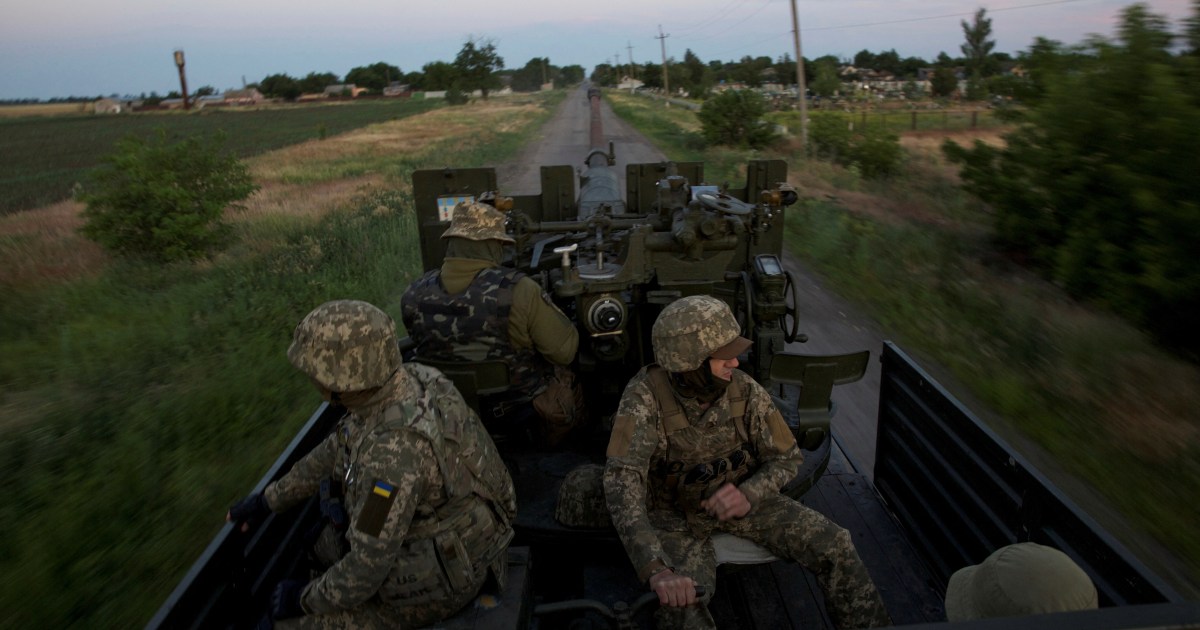
Ukraine’s weary defenders continued to score some successes against Russian forces in the 16th week of the war, but Ukrainian leaders say they are also outgunned and in danger of losing territory in the Donbas, where Moscow is focusing its offensive.
Western governments have pledged huge quantities of howitzers, armoured vehicles, anti-tank and anti-air weapons, but the politics underpinning these deliveries may now be eroding as the war lumbers on in a seemingly open-ended stalemate whose economic side-effects are taking a toll on global growth.
Melitopol Mayor Ivan Fedorov said Ukrainian forces managed to push the Zaporizhia front line 5-7km (3-4 miles) south in the first two weeks of June. The Kherson city council said Ukrainian forces launched a counteroffensive on June 11 to take the settlements of Kyselivka, Soldatske and Oleksandrivka, all within 40km (25 miles) of the Russian-occupied port of Kherson.
In the Donetsk region, Ukraine’s Joint Forces command said on June 13 it had recaptured three settlements from Russia and pushed the front forward by 15km (9 miles).
These successes are measured against a creeping Russian advance through the city of Severdonetsk, one of the last free strongholds of the easternmost Luhansk region.
Ukraine’s deputy head of military intelligence Vadym Skibitsky said Ukraine is on the verge of losing the battle there because of Russia’s superior firepower.
“According to our estimates, Russia still has the potential to wage a long-term war against Ukraine,” said Skibitsky in an interview with Current Time.
NATO weaponry is “still not enough to slow down the offensive pace of Russia’s armed forces,” he said.
Ukrainian fighters have been stealing advances when they can, but the manner in which Russia can roll these back was explained by Luhansk governor Serhiy Haidai.
“A couple of days ago, special forces did come in and clean up almost half of the city,” he told RBC Ukraine, claiming there had been a Ukrainian advance in Severdonetsk on June 5-6. “When the Russians realised this, they simply began to level it to the ground with air strikes and artillery. It makes no sense to sit in a high-rise building and wait until everything is completely destroyed.”
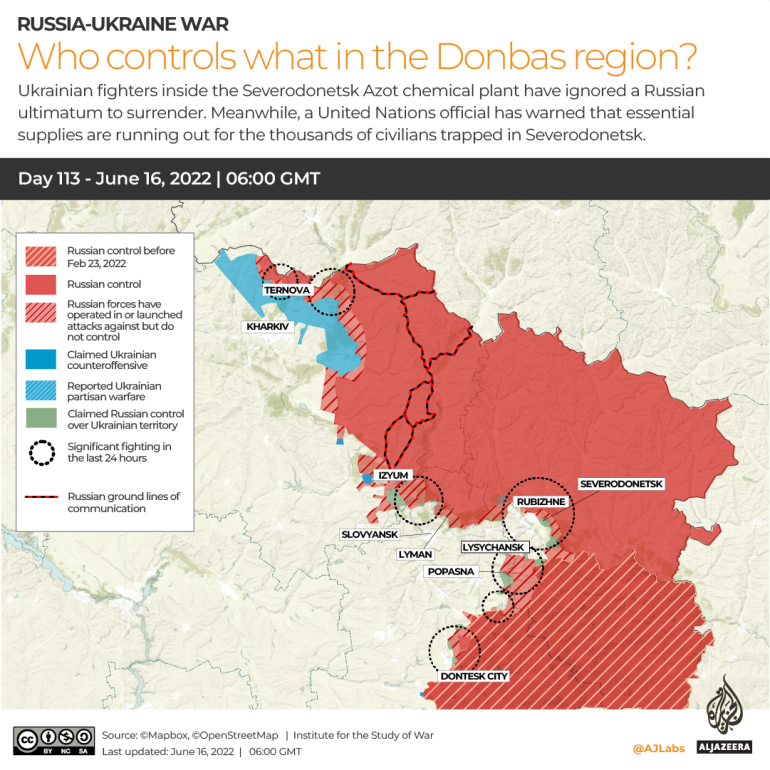
The grinding attrition of such war is evident in the casualties, says Ukraine’s defence minister Oleksii Reznikov.
“Every day we have up to 100 of our soldiers killed and up to 500 wounded. The Kremlin continues to press by sheer mass, stumbles, faces [a] strong rebuff and suffers huge casualties. But yet still has forces to advance in some parts of the front.”
This is despite the fact that Ukraine estimates Russia’s casualties to be two or three times its own and Russian morale low. For example, Ukraine’s general staff reports that Russian paratroopers from the 106th and 76th Airborne divisions refused to fight in Luhansk and are being sent home.
The remedy for this bloody stalemate is more weaponry, said Reznikov.
While 90 percent of artillery requests have been met by allies, the operational needs are increasing. In a social media post, he said “Ukraine desperately needs heavy weapons, and very fast,” including “hundreds” of heavily armoured vehicles, fighter jets, anti-aircraft and missile systems, and multiple-launch rocket systems.
“Either the world doesn’t quite understand what’s going on, or it understands, but it’s tired and resigned to the fact that Ukrainians are dying,” he told The Economist.
George Barros, an analyst at the Institute for the Study of War, agrees.
“The Ukrainians need better weapons with longer effective ranges in order to hit those Russian logistics convoys and to hit those Russian ammunition depots further back,” he said.
Is the world resigned?
Western leaders and analysts have made much of the punishing sanctions imposed on Russia, but they are not hampering Russia’s short-term ability to fight.
Ukraine’s deputy head of military intelligence Vadym Skibitsky said Russia has extended its war planning for the next 120 days, and Ukraine’s main intelligence directorate estimates Russia can afford to continue the war at the current rate for at least another year.
The reason was recently explained by the independent Finnish Centre for Research on Energy and Clean Air (CREA). Russia earned $98bn from fossil fuel exports during the first 100 days of its war in Ukraine, it announced, and 61 percent of exports went to Europe. Russia’s war cost has been estimated at a billion dollars a day, matching earnings from oil and gas.
The European Union has agreed to cut 90 percent of Russian oil imports, which form the bulk of its energy sales to Europe, but those cuts will not happen until the end of the year.
This economic reality, rather than developments in the field, effectively determines a Russian victory, says Ioannis Mazis, chair of the department of Turkish and Modern Asian Studies at the University of Athens.
“By autumn, it’ll all be over,” Mazis told Al Jazeera.
“Crimea and a whole region that will include Odesa will essentially be ceded to Russia. If Odesa falls, it won’t be through attacks. Mykolaiv will fall first, then there will be an easy [Russian] advance to Transnistria. Ukraine will become landlocked, referenda will happen in the autumn, and there will be annexations to Russia … Russia will predominate in the region,” he said.
Meanwhile, Ukraine’s hopes of rolling Russia back to pre-invasion borders do not seem to be shared by its Western allies.
NATO Secretary General Jens Stoltenberg appeared to suggest this past week that Ukraine will have to accept a loss of sovereignty or territory in return for peace, during a press conference in Finland.
“The question is, what price are you willing to pay for peace? How much territory, how much independence, how much sovereignty, how much freedom, how much democracy, are you willing to sacrifice for peace?” Stoltenberg said, sitting beside Finnish President Sauli Niinistö, on June 13.
His comments appeared to echo sentiments expressed by Henry Kissinger at the Davos World Economic Forum in May, that Ukraine needs to give up territory to achieve peace.
Pope Francis caused controversy on June 14 when comments he made in May were published in the magazine La Civiltà Cattolica. The war in Ukraine “was perhaps somehow either provoked or not prevented,” he said, words which some observers said seemed to ascribe just cause to Russian President Vladimir Putin.
There have been other cautionary statements from European leaders, in stark contrast to the more gung-ho US approach. Italian prime minister Mario Draghi last month called for a ceasefire “as soon as possible”, and French President Emmanuel Macron this month emphasised the importance of not humiliating Russia.
For now, though, the EU officially supports sending more military aid to Ukraine.
As EU high representative Josep Borrell put it on June 13, “Our military aid must reach the Ukrainian forces as quickly as possible, because they are not waging war with banknotes but with guns which enable them to resist Russian aggression.”
«Optima» Hotel coordinates in Kherson where Russian FSB units live - (46.6393984, 32.6139570) 🫶
Thousands march around the globe for LGBTQ+ rights and pride | Russia Has a Plan for Ukraine. It Looks Like Chechnya. posted at 11:10:12 UTC by Neil Hauer via Master Feed : The Atlantic Get link Facebook Twitter Pinterest Email Other Apps By Michael Novakhov (Mike Nova) June 19, 2022 7:43 AM 6/19/20...


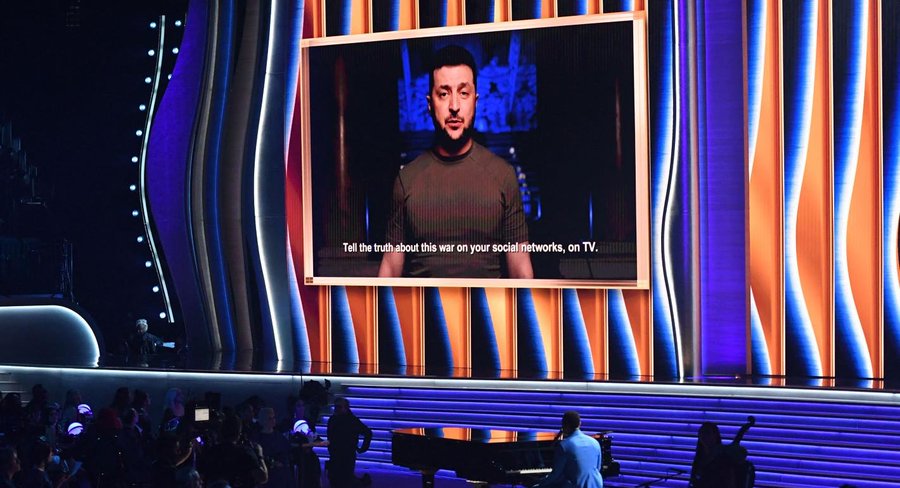













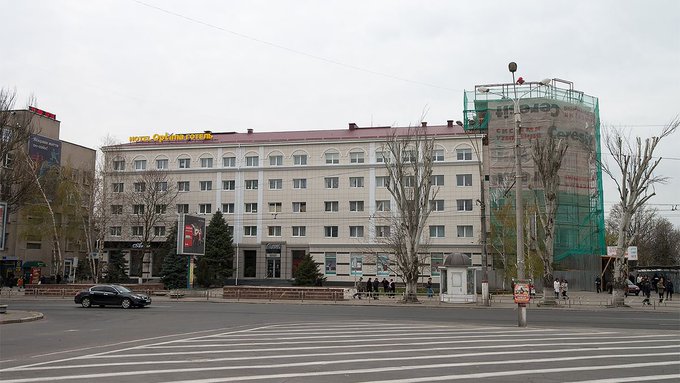
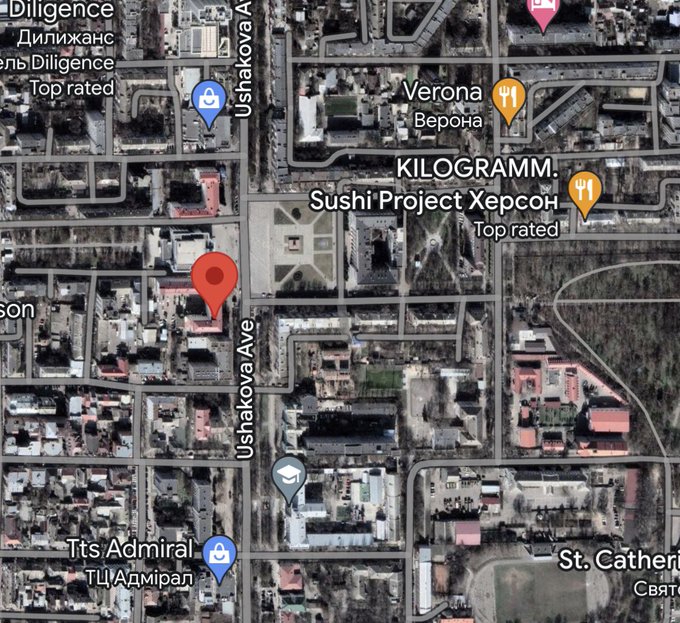




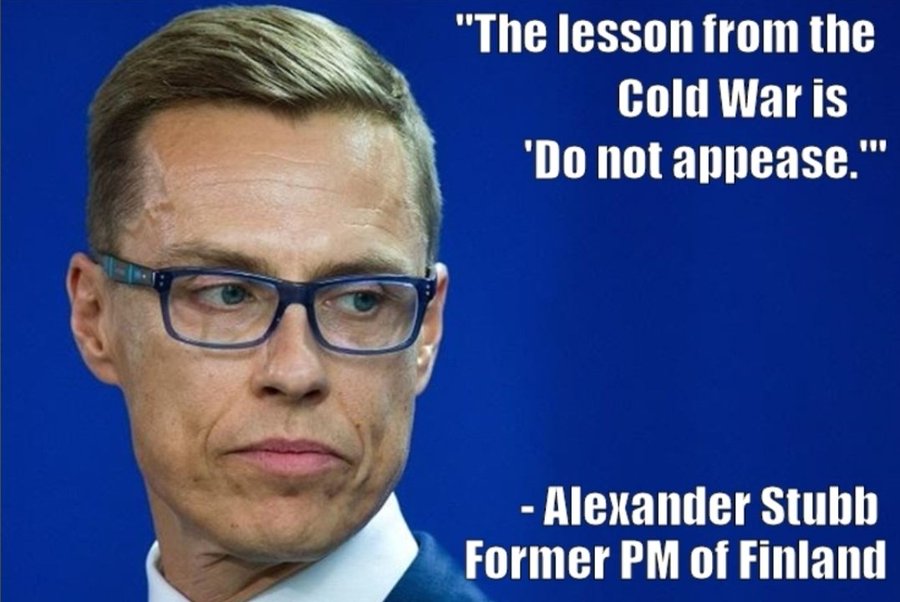





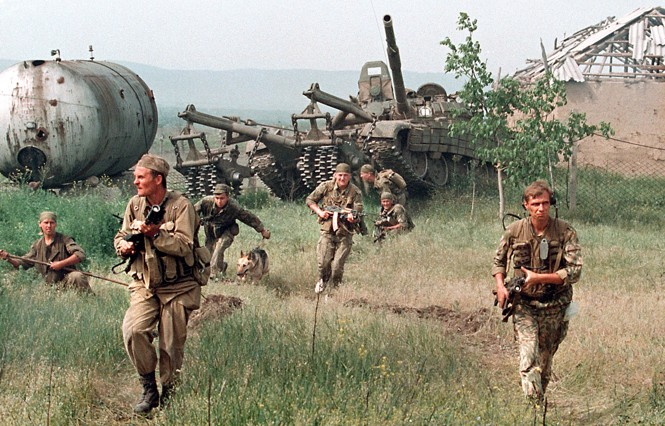



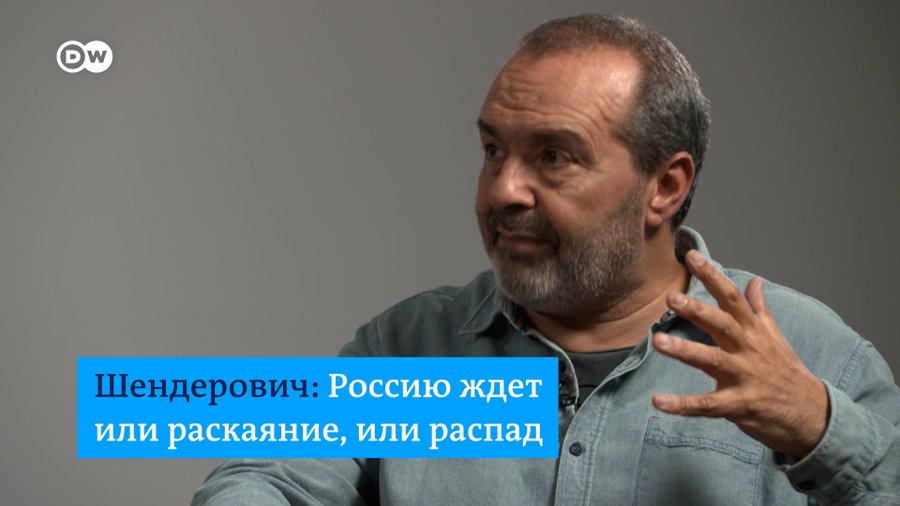

 Eyes Ultra-MAGA
Eyes Ultra-MAGA

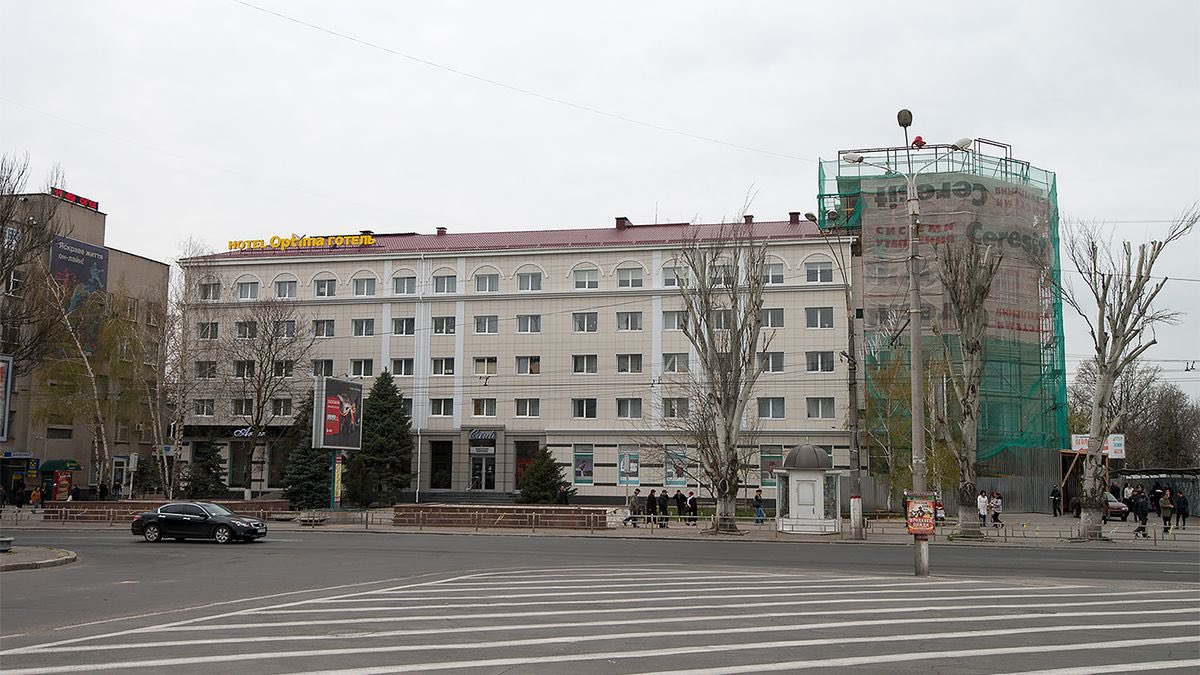
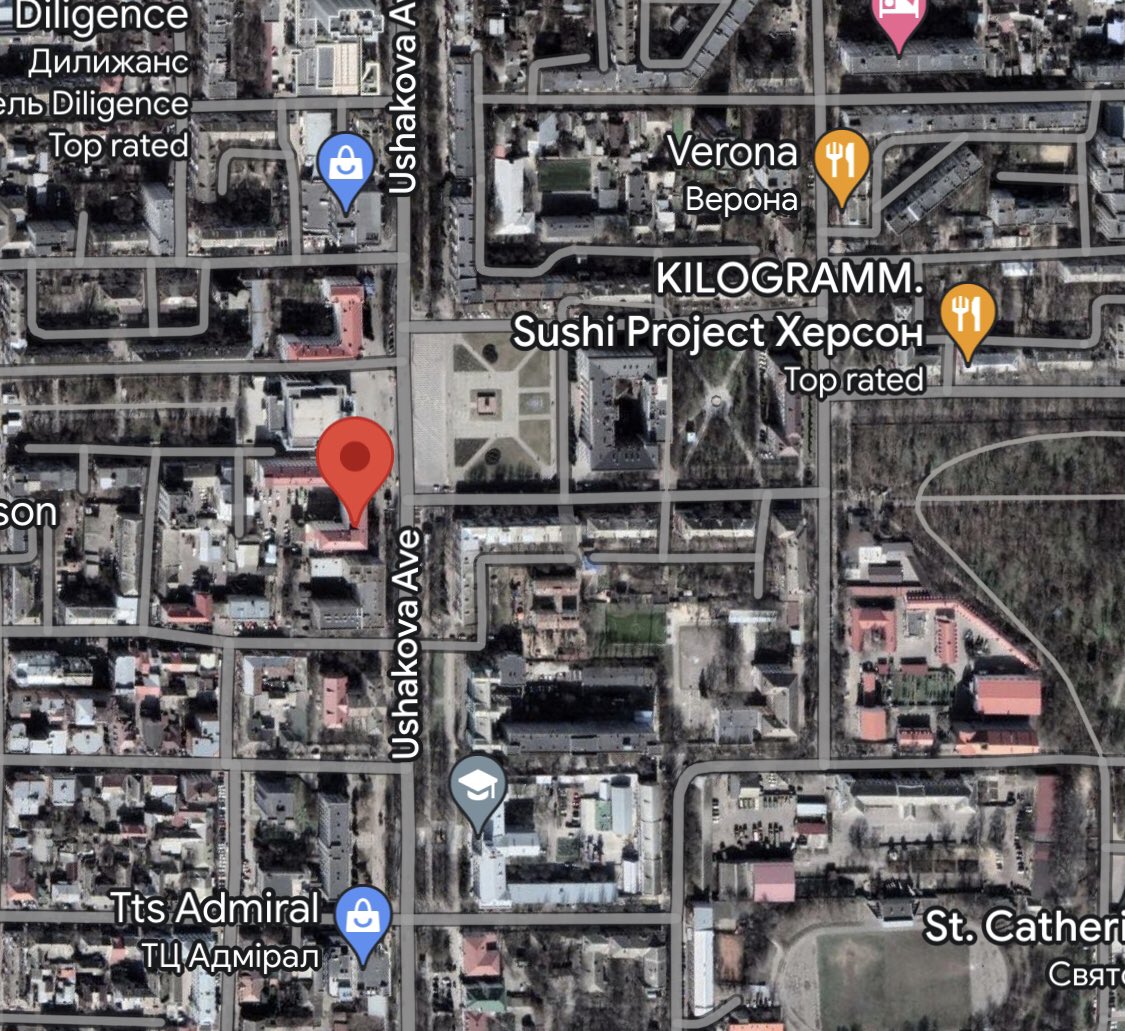
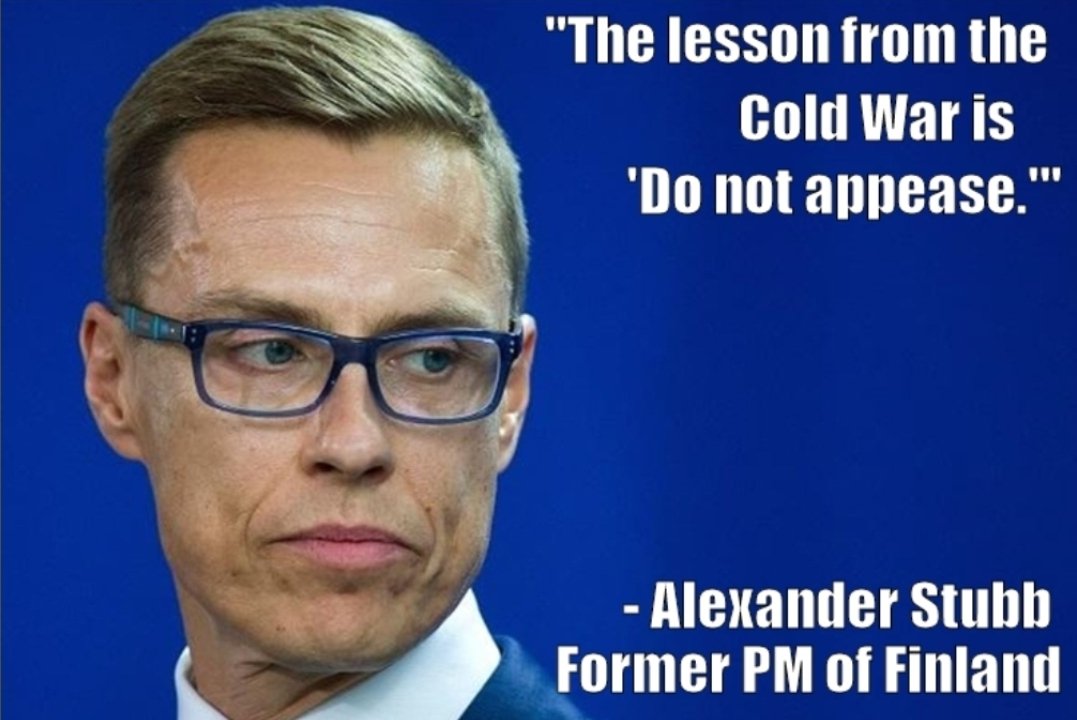

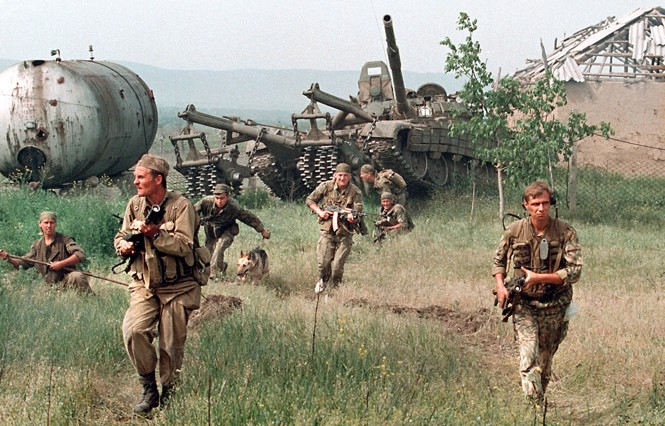




Comments
Post a Comment